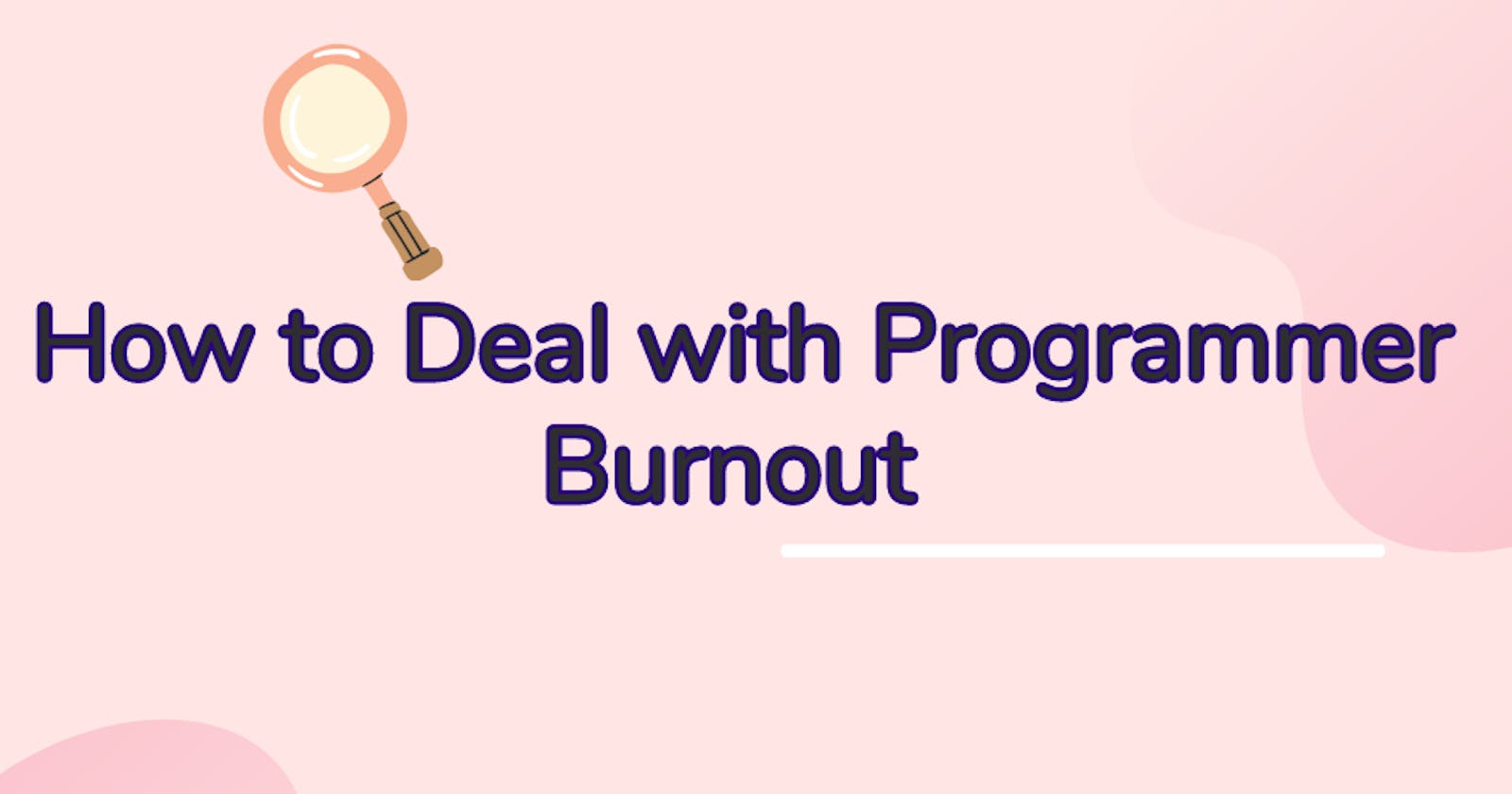Table of contents
- Monotonous activity:
- External and/or internal pressure:
- Lack of a work-life balance:
- Not taking breaks:
- Not engaging in other activities asides from programming:
- A feeling of emptiness:
- Minimal or low productivity:
- Physical fatigue or constant exhaustion:
- Lack of motivation or zeal:
- Insomnia:
- Take a break
- Adopt a healthy lifestyle
- Take on a different activity outside of programming
- Define your goals
- Prioritize yourself
At first, you're new to programming, and it's all very exciting and fun. It offers you a challenge to build projects and solve complex problems and that is thrilling for you.
It feels like a hobby and what started as a hobby has now developed into work and after a while, it becomes your job. Initially, you were writing code because it brought you excitement, and you could go on for long without realizing how much time had gone by. After several years, it has now become a monotonous drag. The enthusiasm with which you started is gone, and you dread waking up each day to work. I won't be going ahead of myself if I say this is a phase most programmers have gone through at some point in their lives.
Programmer burnout is a real thing and has been around for a long time. The effects are unfortunate if not managed properly. Programmers' burnout can be defined as mental and physical breakdown caused by extreme stress at work.
The causes of programmers' burnout are not far-fetched with the monotonous nature of programming being the first culprit. Let me paint a scenario: You write code 40-60hours weekly for 3 years. On most days you're seated at your desk in front of your computer with your eyes glued to your screen. Same pattern every day trying to meet up to unending deadlines, you're forgetting you're only human and not a robot. You don't take occasional breaks or try to engage in a different activity once in a while. Gradually and slowly it slides into stress, it gets even worse and it becomes burnout. What could have been easily managed has now become a full-blown crisis.
The causes of burnout are:
Monotonous activity:
If you were to evaluate which of your engagements take the longest time of your day, I'm guessing it would be coding, debugging, and completing projects. Carrying out the same activities repetitively could drain anyone and sap you of the energy and enthusiasm needed for the work. Doing the same things every day and not trying to fit in some other activities could be a bore. The fact that programming isn't so much of physical activity doesn't mean it is any less tasking. It is a mental activity and so it requires you to think and be analytical thus tasking your brain.
External and/or internal pressure:
Pressure from external sources could be from your work environment. With deadlines to meet and so many projects to embark on and conclude, not including superiors breathing down your neck and such a short time to get over your responsibilities, the pressure could be overwhelming. That aside, there is also internal pressure that stems from the need to accomplish goals. Accomplishing your goals no doubt gives you some sense of worth and a feeling of achievement but beating yourself up on things that could be hindering the realization of such goals, over which you have no control isn't the best way out. It just mounts so much pressure on you that you simply fail to give yourself some credit for how hard you're trying. Eventually, you end up feeling like you're not doing enough and that just makes you feel like a deadbeat.
Lack of a work-life balance:
Most people do not realize where they need to draw the line when it comes to working. They let work-life mix up with their personal lives to the point where there is no clear-cut difference. A whole lot of people are not aware that work is just one part of your life and not your whole life. Realizing this balance helps you manage your responsibilities better. Setting firm boundaries as little as putting your work device away after work or not checking emails after work hours could help you to maintain that much-needed balance.
Not taking breaks:
In every facet of life, across all careers, the importance of taking breaks cannot be overemphasized. Observing breaks help you relax, generate new ideas, and new approaches, and might just be the propeller you need to start on a good foot when you're back to work. Working at a stretch over long periods saps you with the energy and fervor needed to effectively carry out tasks. Breaks serve as that energy that refuels you to go again with enthusiasm.
Not engaging in other activities asides from programming:
This teams up with not having a social life. Quite frankly programming could be quite a lonely activity and this is in no way anyone's fault. I mean how else would anyone expect a job, which requires you to sit in one spot, getting into the zone and concentrating and thinking hard for hours, to be anything else if not lonely. Most times you do have to be by yourself to avoid distractions. Regardless, you need to be able to manage this properly.
Certain pointers indicate that a person could be going through a programmers burnout
A feeling of emptiness:
A constant feeling of emptiness is one thing that continually plagues programmers going through burnout. You begin to second-guess your abilities. You'd keep doubting yourself and wondering if you are good enough or if your work makes an impact or if you're as smart as you think. You'd continually doubt your essence and your worth and just feel you're not good for anything.
Minimal or low productivity:
Considering the situation, you're not going to be able to perform at your best. It will be almost impossible for you to deliver effectively. You know this isn't the best you can do but you can't help it because of how you feel. You'll feel worse and disappointed in yourself and this would make you even perform less. Concentration and focus levels would reduce and so would productivity levels.
Physical fatigue or constant exhaustion:
A burnout weighs you down physically just as it does mentally and emotionally. You constantly feel tired and weak and not able to do much. Headache and general weakness are also common, followed by bouts of occasional outbursts because of how exhausted you feel.
Lack of motivation or zeal:
In this period you're going to feel a lot laidback about work and responsibilities in general. Nothing is going to interest you and it just feels like so many things are going on around you but you're just moving through it and you're not a part of it. There's no enthusiasm or zeal to carry out your work and you are just out of touch with the happenings around you.
Insomnia:
Difficulty sleeping is also a sign of programmers' burnout. This signals that you are taking much more than you can handle and it ends up overwhelming you and sleep becomes difficult.
If not handled effectively this could become a cycle. You feel swamped and this makes you not able to do much or be productive which in turn makes you feel empty and throws you into burnout and depression and it goes over and over again.
The first way to handle this would be to give yourself a break.
Take a break
At this point what you need is a break. A break from work, a break from trying to get it done, and a break from feeling inadequate. You need to take a break to catch up with yourself and allow yourself to breathe. The length of the break depends on how bad the burnout is. It could range from a week to a few weeks or even a couple of months. These breaks help you renew your strength, calm your mind and sharpen your brain. And to avoid future cases of burnout, it’s important to incorporate these breaks into your work routine. Take regular, worthwhile breaks so you don’t fall into the same burnout cycle. It’s also important to observe quality rest often to not overwork yourself.
Adopt a healthy lifestyle
A healthy lifestyle includes a work-life balance. Adopting little habits like working when it’s work time and resting when it’s time for rest. It could also be drinking enough water and getting sunshine. You should also exercise often to keep you mentally and physically fit. At your place of work, it’s also important to make the right choices at all times. Making a bad choice could lead to a bad result which can affect your productivity in many areas.
Take on a different activity outside of programming
Occasionally you can try to do something different other than writing codes. This could be a social activity altogether like sports, volunteering, arts, or traveling. You could also take time out to try out a new event. These activities help give you a different feeling of life outside of your work. That aside, these are fun activities to keep you alive and help you stay energized. It also helps you keep your passion and break the monotonous nature of programming.
Define your goals
Setting goals give you direction and define your focus. It helps define what’s important to you and should be given immediate attention and what could be delayed. Having goals makes you have a working plan which you follow to achieve the goals. It’s important to set these goals based on what you want to achieve then break the goals into smaller, more accomplishable goals. This would help with the realization of your goals faster and would also help make you feel fulfilled with each goal you achieve. Start with not having an unrealistic to-do list that will make you feel unfulfilled or dissatisfied and therefore puts you under pressure. Set an easily achievable to-do list each day. You should also break down work into smaller chunks to avoid being flustered. Have a different strategy this time so you don’t fall into burnout again.
Prioritize yourself
Most times we do not realize how important it is to put ourselves first. Ahead of work and ahead of everything else. You should always make yourself your priority. Prioritize yourself enough to not endanger yourself or compromise your health because of deadlines. Take it easy and one step at a time. Work effectively, focus on your goals, rest often and you’re good to go.
Giving no attention to the initial weariness that comes with overworking yourself makes it go from weariness to stress till you slowly slide into burnout and this becomes difficult to control.
Burnout doesn’t just take a toll on your work life it also rubs off on other parts of your life and affects it and that’s why you should have a balance to prevent that from happening.
This article helped us learn about programmers' burnout, what causes it, and ways to avoid or manage it.

